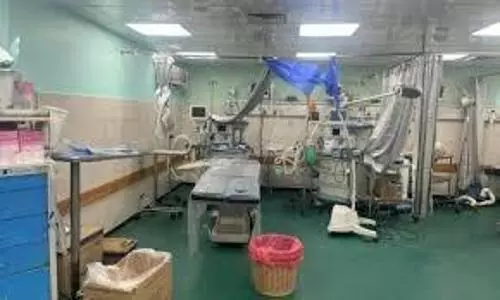
Kerala's stent crisis calls for government intervention
text_fieldsIt was about six months ago that the story of Narayani from Malappuram district hit news headlines. Admitted to Medical College Hospital, Kozhikode following cerebral hemorrhage, Narayani was diagnosed with aneurysm – the condition of weakening of an artery wall that results in bulding and rupture. Any treatment required a surgery involving opening of the skull. However, through a novel experiment, she got cured within two weeks. The ones who led the experiment were the doctors in the newly established super-speciality of interventional radiology in Kozhikode Medical College. The procedure involved inserting a catheter through a narrow hole in the blood vessel of foot.
Narayani had to spend less than a tenth of the Rs 15-20 lakhs she would have incurred in a private hospital. The interventional radiology department is now close to two years old, the kind of which exists in Kerala ony in Sree Chithra Institute of Medical Science in Thiruvananthapuram in addition to Kozhikode. However, sadly enough the one in Kozhikode has not been functioning for the past few days. The reason is that the supply of the necesssary equipment and consumables for such surgery such as catheter, stent, neuro coil, wire tube and balloon, has been suspended by vendor companies for non-receit of arrears from insurance companies. And because of this, the hospital is constrained to send back patients, even the ones arriving on emergency, without treatment.
The amounts pending payment come under the government's Karunya Insurance scheme. The Karunya Arogya Suraksha Padhathi (KASP) launched on 1 April, with the avowed aim of giving health security to nearly two crore people has been a remarkable initiative. But the factors behind the current 'health emergency' are the flaws inherent in its implementation. The responsibility of providing the service under the scheme is with Reliance Insurance. Until 30 June, the outstanding receivables for the stent suppliers for the medical colleges of the state was to the tune of Rs 50 crore. Out of this, the major debtors are medical colleges in Kozhikode, Alappuzha and Thiruvananthapuram.
Even earlier, companies had once suspended supply of stents a few months ago. In subsequent discussions with the government, an assurance was given that arrears would be cleared in a time-bound manner following which supply was resumed. But Reliance is said to have paid arrears only upto February which pushed the vendors to the drastic action. With the suspension of supply itself, functionng of departments including the internventional radiology department of Kozhikode Medical College, had almost come to a halt. In the Out Patient section alone, nearly 20 patients used to report per day. All these patients would be now forced to approach private hospitals in the following days. Although not affected to this exent so far, Thiruvananthapuram and Alappuzha are also staring at uncertainty in the days ahead.
What could be the reason for such a sad state of affiars, even as Kerala is making major stride in health sector? The state has won plaudits from countries all over the world for having resisted lethal viruses like nipah. And currently, it can also boast of government medical college hospitals that are on a par with private multi-speciality hospitals. The primary health centres in Kerala's villages that were once surrounded by deserted compounds, have started a revival of late. For those who had to spend large sums for treatment, now there are government hospitals with dependable facilities.
There are strict rules also in place to check the exploitation of suppliers of medical equipment including stent. If in spite of all that, the functioning of government colleges turns out of gear, the causes for that have to be analysed in detail. The problem starts with making a private company like Reliance the implementing agency. Allegations have already been raised about the collusion between the private insurance firm and the government agency 'Chiak' (Comprehensive Health Insurance Agency of Kerala) responsible for the administration of Kakrunya scheme. And there are also complaints that this lobby is receiving gratification for stent companies to win supply contract in the coming years too.
The customary indifference of bureaucracy does not elude us even here. These quarters are torpedoing the progress that Kerala has achieved in health sector. Solution should start with a drive to rein in such people. The government and the health department should urgently act with the realization that this is about the fundamental right of man to live.























